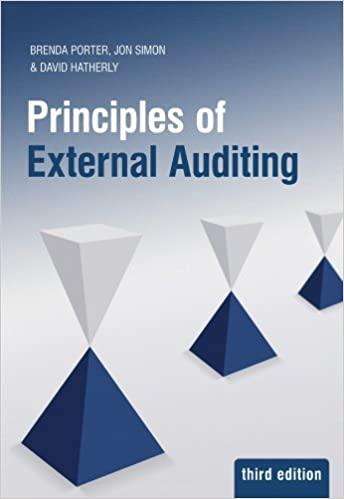Question
Need help with chapter review question to study for test. Which of the following would not be classified as Inventory? a. Raw Materials b. Office
Need help with chapter review question to study for test.
Which of the following would not be classified as Inventory?
a. Raw Materials
b. Office Supplies
c. Finished Goods
d. Work in Process
e. All of the above would be classified as Inventory.
2. In a perpetual inventory system,
a. the Inventory and Cost of Goods Sold accounts are updated once a period.
b. temporary accounts, such as Purchases and Purchase Discounts, are used.
c. the availability of computer technology is generally not considered important.
d. a purchase of goods would require a debit to Inventory and a credit to either Cash or Accounts Payable.
e. no entry is made for Cost of Goods Sold expense when goods are sold to customers.
3. Mississippi Pine Warehouse gave Mattingly Furniture terms of 2/10, n/30. Mattingly paid for the coffee tables on April 22. On the 22nd, Mattingly would make which of the following entries?
a. Accounts Payable 20,000
Cash 19,600
Purchases Discounts 400
b. Accounts Payable 20,000
Cash 19,600
Sales Discounts 400
c. Accounts Payable 20,000
Cash 19,600
Inventory 400
d. Accounts Payable 19,600
Purchase Discount 400
Cash 20,000
e. none of the above
4. Which of the following companies are likely to use the specific identification method to value its inventory?
Jewelry Retailer Oil Refinery Car Manufacturer Lumber Company
a. yes no no no
b. yes no yes no
c. no yes no yes
d. no no yes no
e. yes yes yes yes
5. The FIFO method of inventory costing
a. assumes that the goods acquired first are the first ones sold, leaving the oldest costs in ending inventory.
b. uses the per unit costs of the most recently acquired goods to determine the cost of goods sold.
c. requires businesses to sell the oldest inventory units first.
d. yields a lower net income than the LIFO method in an inflationary environment when these methods are applied to the same financial data.
e. assumes that the goods acquired first are the first ones sold, leaving the newest costs in ending inventory.
6. When LIFO perpetual inventory costing is used, which costs are included in ending inventory and cost of goods sold?
Ending inventory Cost of goods sold
a. Newest Oldest
b. Oldest Newest
c. Newest Average
d. Oldest Average
e. Average Average
7. When the moving average inventory valuation method is used, an average per-unit cost is computed
a. after each purchase.
b. before each purchase.
c. after each sale.
d. before each sale.
e. before closing entries are made.
8. When FIFO and LIFO are compared,
a. LIFO yields a higher net income during inflationary times than FIFO does.
b. FIFO yields a lower balance sheet value for ending inventory than LIFO during periods of inflation.
c. FIFO and LIFO show, respectively, the oldest and newest per-unit inventory costs in the ending inventory on the balance sheet.
d. LIFO is generally perceived to better match current dollars of revenues and expenses, giving a profit figure that better reflects a business
Step by Step Solution
There are 3 Steps involved in it
Step: 1

Get Instant Access to Expert-Tailored Solutions
See step-by-step solutions with expert insights and AI powered tools for academic success
Step: 2

Step: 3

Ace Your Homework with AI
Get the answers you need in no time with our AI-driven, step-by-step assistance
Get Started


